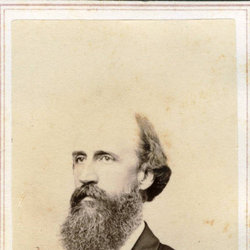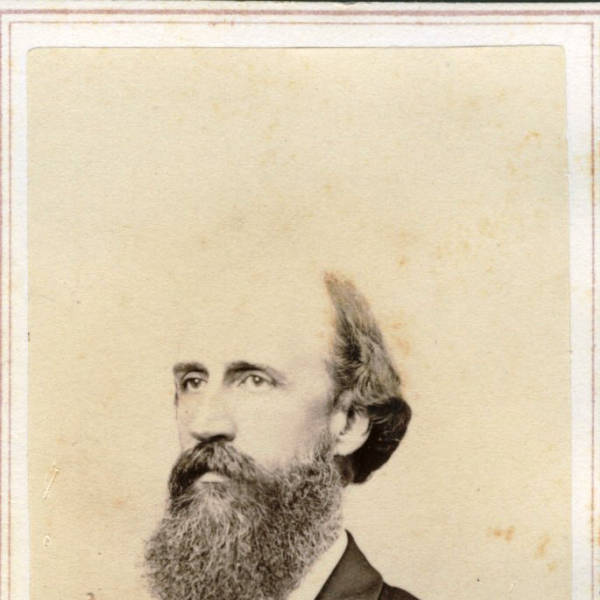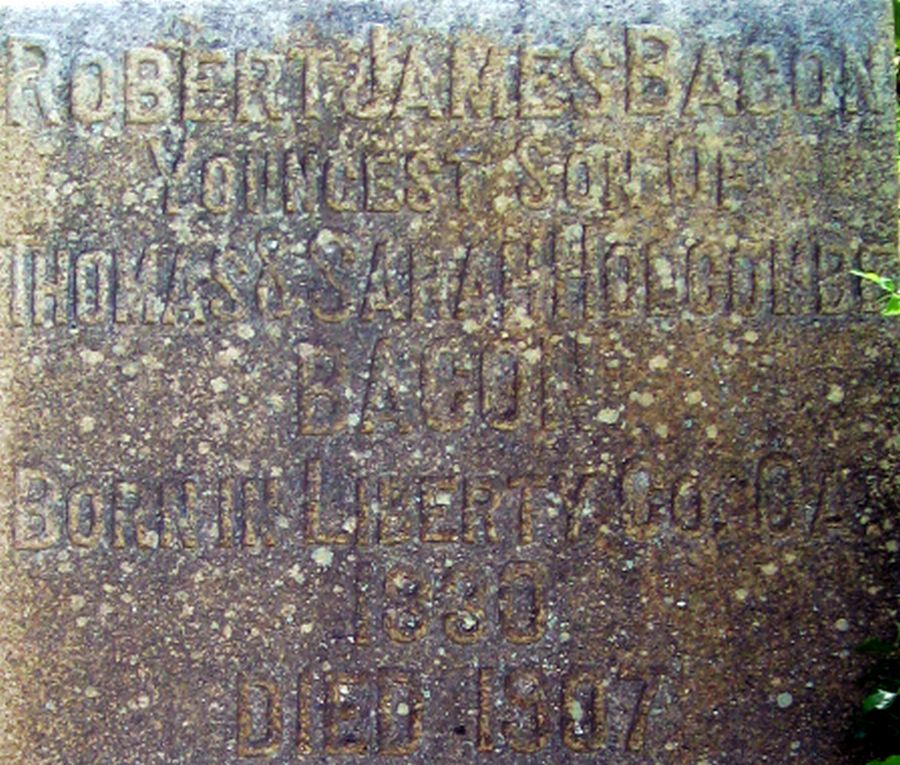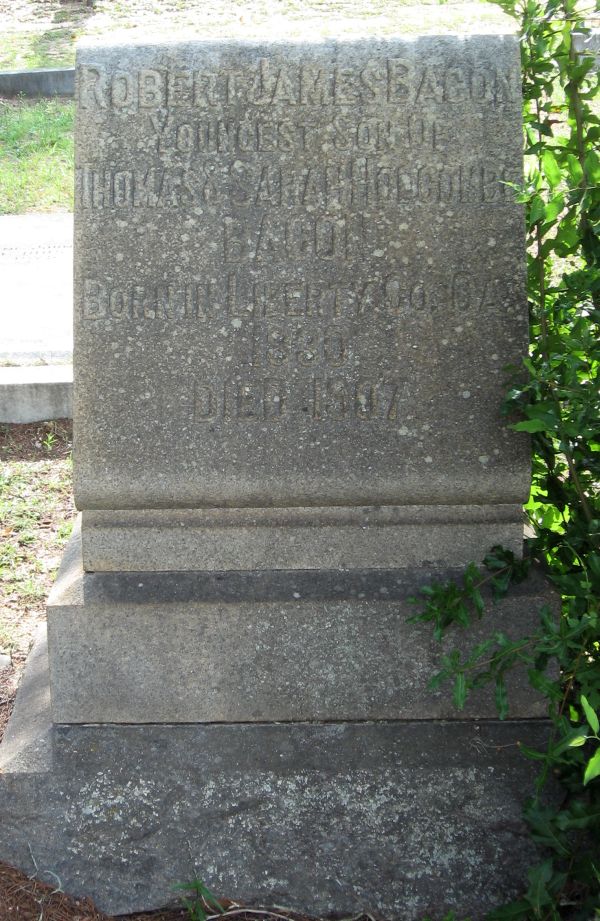The following is taken from his biography in "The History of Dougherty County" pages 154-157:
Robert James Bacon was born in Liberty County, Georgia, December 6, 1830. His father was Thomas Bacon, whose ancestors were of Puritan extraction, settling at Dorchester Heights, Mass., and then Dorchester, S.C., from thence moving to St. John's Parish, now Liberty County, Georgia. His mother, Sarah Holcombe, was the daugther of Rev. Henry Holcombe, D.D., a captain in the Revolutionary War, who founded the First Baptist Church of Savannah.
Robert was the youngest of a family of eight sons and one daughter, and was reared by his mother, his father having died almost before his recollection. He spent his childhood at the old home in Liberty County, attending school at Walthourville until he was eighteen years old, when he went to the University of Georgia at Athens. He was graduated from the State University at its fiftieth anniversary commencement. Fifty years later he attended the centennial commencement of his Alma Mater, and enjoyed seeing his son, R. J. Bacon, Jr., receive his law diploma, exactly half a century after he had finished his own school days. He studied law in Savannah under his brother, Edwin H. Bacon, and was admitted to the bar. He practiced law in Lagrange with his brother, Thomas J. Bacon. While there, in 1853, he married Miss Belle Walton of Washington, Wilkes County, Georgia. Five years later, on account of delicate health, Mr. Bacon moved to Mitchell County, where he had purchased land at the Horseshoe Ben of Flint River.
Mr. Bacon was one of the pioneer citizens of Southwest Georgia. As a planter he cleared the virgin forest with slave labor and transformed it into the fertile new ground with abundant crops of corn and cotton.
At the outbreak of the war in 1861, Mr. Bacon volunteered for service in the Confederate army, but was not accepted on account of his physical condition. Although not able to do military duty, he was active in serving the Confederacy in the Commissary Department, filling the place of quartermaster in that section of the state, collecting tithes of food and cattle for the Southern army and storing them in a government pound on his own plantation. He was also elected to the lower House of the Georgia Legislature, and served the first two years of the war. He was then elected to the Senate for the ensuing two years.
After the war Mr. Bacon was a factor of conservatism in the trying ordeal of Reconstruction. During this period he lived on his plantation and most of his negroes remained with him, not moving from their old home as so many on the adjoining plantations did.
Major Bacon, as he was familiarly called, was a leader in the industrial development of this section. He was largely instrumental in the construction and location of the Atlantic and Gulf Railroad from Albany to Thomasville, now a part of the Atlantic Coast Line system. He was a director of this company, and the construction engineers, without his knowledge, located a station on his plantation and named it Baconton.
In 1868 Major Bacon's wife died, leaving four daughters and one son. The home was borken up, and the best educational advantages obtainable were sought for his children. His life was further saddened by the loss of his youngest child, his only son, Robert, who died at the age of seven. Major Bacon was a devoted father to his motherless children.
In 1872 Major Bacon was appointed judge of the Mitchell County Court, though he served but a few months. Moving to Albany in the fall of 1872, he became a member of the cotton firm of Welch, Cook & Bacon, later changed to Welch & Bacon, which did a large business in the surrounding counties. It was here, in 1874, that he brought his second wife, who, as Mrs. Elizabeth T. Crowe, had been the gifted instructor of Art and Music at Wesleyan College in Macon.
Major Bacon's family now consisted of his wife and her daughter, Mamie Crowe, and his three daugthers, Ella, Belle and Laura, the edlest daughter, Corneille, having married Robert J. Willingham, of Macon.
His large business interests, his public-spirit in all the affairs of Albany, his church duties and home and social ties made him one of the most sought-after and active personalities in the community. His sunny disposition and broad sympathy, his strict attention to business and his high sense of honor won for him enduring friendships among all classes.
In 1880 business reverses came, and later on Major Bacon moved to his Plantation in Mitchell County. In former years Major Bacon had been successful in starting the planting and shipping of large quantities of watermelons, and encouraged the idea of diversified crops among the planters.
The great pecan industry of Southwest Georgia had its beginning on Major Bacon's plantation. In 1872 his young daughters planted some pecan nuts, which had been sent them from Texas, in their garden. Five of these young trees were later transplanted by G. M. Bacon, Major Bacon's nephew, of DeWitt, Ga., who was really the pioneer of this industry. To him must be given the credit of the rapid advancement and success of the work. Major Bacon may well be called the prophet of this industry, for he foresaw its possibilities and encouraged this enterprise. He foretold the shelling of the nuts by machinery and the extraction of oil from the nuts, both of which have recently been realized. Major Bacon was one of the four who organized the Southern Nut Growers Association, which became the National Nut Growers Association.
On the night of June 5, 1907, at the ripe age of seventy-six, Major Bacon "entered into rest." Funeral services were conducted at the Baconton Baptist Church, and he was laid to rest in Oakview Cemetery in Albany. On his monument is inscribed the motto of his life: "On Christ the Solid Rock I Stand."
The following is taken from his biography in "The History of Dougherty County" pages 154-157:
Robert James Bacon was born in Liberty County, Georgia, December 6, 1830. His father was Thomas Bacon, whose ancestors were of Puritan extraction, settling at Dorchester Heights, Mass., and then Dorchester, S.C., from thence moving to St. John's Parish, now Liberty County, Georgia. His mother, Sarah Holcombe, was the daugther of Rev. Henry Holcombe, D.D., a captain in the Revolutionary War, who founded the First Baptist Church of Savannah.
Robert was the youngest of a family of eight sons and one daughter, and was reared by his mother, his father having died almost before his recollection. He spent his childhood at the old home in Liberty County, attending school at Walthourville until he was eighteen years old, when he went to the University of Georgia at Athens. He was graduated from the State University at its fiftieth anniversary commencement. Fifty years later he attended the centennial commencement of his Alma Mater, and enjoyed seeing his son, R. J. Bacon, Jr., receive his law diploma, exactly half a century after he had finished his own school days. He studied law in Savannah under his brother, Edwin H. Bacon, and was admitted to the bar. He practiced law in Lagrange with his brother, Thomas J. Bacon. While there, in 1853, he married Miss Belle Walton of Washington, Wilkes County, Georgia. Five years later, on account of delicate health, Mr. Bacon moved to Mitchell County, where he had purchased land at the Horseshoe Ben of Flint River.
Mr. Bacon was one of the pioneer citizens of Southwest Georgia. As a planter he cleared the virgin forest with slave labor and transformed it into the fertile new ground with abundant crops of corn and cotton.
At the outbreak of the war in 1861, Mr. Bacon volunteered for service in the Confederate army, but was not accepted on account of his physical condition. Although not able to do military duty, he was active in serving the Confederacy in the Commissary Department, filling the place of quartermaster in that section of the state, collecting tithes of food and cattle for the Southern army and storing them in a government pound on his own plantation. He was also elected to the lower House of the Georgia Legislature, and served the first two years of the war. He was then elected to the Senate for the ensuing two years.
After the war Mr. Bacon was a factor of conservatism in the trying ordeal of Reconstruction. During this period he lived on his plantation and most of his negroes remained with him, not moving from their old home as so many on the adjoining plantations did.
Major Bacon, as he was familiarly called, was a leader in the industrial development of this section. He was largely instrumental in the construction and location of the Atlantic and Gulf Railroad from Albany to Thomasville, now a part of the Atlantic Coast Line system. He was a director of this company, and the construction engineers, without his knowledge, located a station on his plantation and named it Baconton.
In 1868 Major Bacon's wife died, leaving four daughters and one son. The home was borken up, and the best educational advantages obtainable were sought for his children. His life was further saddened by the loss of his youngest child, his only son, Robert, who died at the age of seven. Major Bacon was a devoted father to his motherless children.
In 1872 Major Bacon was appointed judge of the Mitchell County Court, though he served but a few months. Moving to Albany in the fall of 1872, he became a member of the cotton firm of Welch, Cook & Bacon, later changed to Welch & Bacon, which did a large business in the surrounding counties. It was here, in 1874, that he brought his second wife, who, as Mrs. Elizabeth T. Crowe, had been the gifted instructor of Art and Music at Wesleyan College in Macon.
Major Bacon's family now consisted of his wife and her daughter, Mamie Crowe, and his three daugthers, Ella, Belle and Laura, the edlest daughter, Corneille, having married Robert J. Willingham, of Macon.
His large business interests, his public-spirit in all the affairs of Albany, his church duties and home and social ties made him one of the most sought-after and active personalities in the community. His sunny disposition and broad sympathy, his strict attention to business and his high sense of honor won for him enduring friendships among all classes.
In 1880 business reverses came, and later on Major Bacon moved to his Plantation in Mitchell County. In former years Major Bacon had been successful in starting the planting and shipping of large quantities of watermelons, and encouraged the idea of diversified crops among the planters.
The great pecan industry of Southwest Georgia had its beginning on Major Bacon's plantation. In 1872 his young daughters planted some pecan nuts, which had been sent them from Texas, in their garden. Five of these young trees were later transplanted by G. M. Bacon, Major Bacon's nephew, of DeWitt, Ga., who was really the pioneer of this industry. To him must be given the credit of the rapid advancement and success of the work. Major Bacon may well be called the prophet of this industry, for he foresaw its possibilities and encouraged this enterprise. He foretold the shelling of the nuts by machinery and the extraction of oil from the nuts, both of which have recently been realized. Major Bacon was one of the four who organized the Southern Nut Growers Association, which became the National Nut Growers Association.
On the night of June 5, 1907, at the ripe age of seventy-six, Major Bacon "entered into rest." Funeral services were conducted at the Baconton Baptist Church, and he was laid to rest in Oakview Cemetery in Albany. On his monument is inscribed the motto of his life: "On Christ the Solid Rock I Stand."
Family Members
Sponsored by Ancestry
Advertisement
Advertisement

























